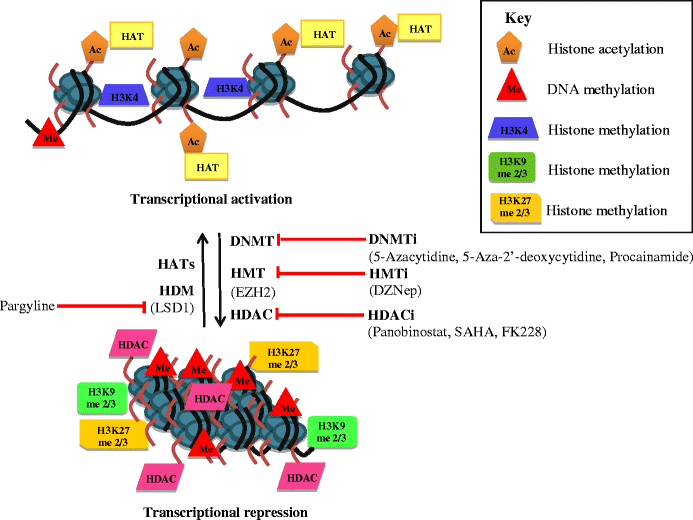Epigenetic regulation of prostate cancer
- PMID: 22704335
- PMCID: PMC3365395
- DOI: 10.1007/s13148-011-0041-7
Epigenetic regulation of prostate cancer
Abstract
Prostate cancer is a commonly diagnosed cancer in men and a leading cause of cancer deaths. Whilst the underlying mechanisms leading to prostate cancer are still to be determined, it is evident that both genetic and epigenetic changes contribute to the development and progression of this disease. Epigenetic changes involving DNA hypo- and hypermethylation, altered histone modifications and more recently changes in microRNA expression have been detected at a range of genes associated with prostate cancer. Furthermore, there is evidence that particular epigenetic changes are associated with different stages of the disease. Whilst early detection can lead to effective treatment, and androgen deprivation therapy has a high response rate, many tumours develop towards hormone-refractory prostate cancer, for which there is no successful treatment. Reliable markers for early detection and more effective treatment strategies are, therefore, needed. Consequently, there is a considerable interest in the potential of epigenetic changes as markers or targets for therapy in prostate cancer. Epigenetic modifiers that demethylate DNA and inhibit histone deacetylases have recently been explored to reactivate silenced gene expression in cancer. However, further understanding of the mechanisms and the effects of chromatin modulation in prostate cancer are required. In this review, we examine the current literature on epigenetic changes associated with prostate cancer and discuss the potential use of epigenetic modifiers for treatment of this disease.
Figures
References
-
- Altimari A, Grigioni AD, Benedettini E, Gabusi E, Schiavina R, Martinelli A, Morselli-Labate AM, Martorana G, Grigioni WF, Fiorentino M. Diagnostic role of circulating free plasma DNA detection in patients with localized prostate cancer. Am J Clin Pathol. 2008;129(5):756–762. doi: 10.1309/DBPX1MFNDDJBW1FL. - DOI - PubMed
-
- Ambs S, Prueitt RL, Yi M, Hudson RS, Howe TM, Petrocca F, Wallace TA, Liu CG, Volinia S, Calin GA, Yfantis HG, Stephens RM, Croce CM. Genomic profiling of microRNA and messenger RNA reveals deregulated microRNA expression in prostate cancer. Cancer Res. 2008;68(15):6162–6170. doi: 10.1158/0008-5472.CAN-08-0144. - DOI - PMC - PubMed
-
- Appleton K, Mackay HJ, Judson I, Plumb JA, McCormick C, Strathdee G, Lee C, Barrett S, Reade S, Jadayel D, Tang A, Bellenger K, Mackay L, Setanoians A, Schatzlein A, Twelves C, Kaye SB, Brown R. Phase I and pharmacodynamic trial of the DNA methyltransferase inhibitor decitabine and carboplatin in solid tumors. J Clin Oncol. 2007;25(29):4603–4609. doi: 10.1200/JCO.2007.10.8688. - DOI - PubMed
LinkOut - more resources
Full Text Sources

